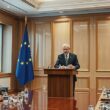Syria’s new government, led by the Islamist militia Hayat Tahrir al-Sham (HTS), aims to maintain good relations with Russia, according to the de facto leader, Ahmed Hussein al-Sharaa, formerly known as Abu Muhammad al-Julani. In an interview with Al Arabiya, he hinted that his government does not necessarily seek the withdrawal of Russian military forces from the country.
After extremist groups in Syria seized control of Damascus and forced the former president, Bashar al-Assad, to resign, the fate of the Russian military bases in the country was in question. Moscow operates a military airbase in Khmeimim and a logistics support center in Tartus, both located on the Mediterranean coast of the country. In 2017, Russia and Syria signed a treaty allowing Russian military contingents to stay in the country for 49 years.
The new leader made conflicting statements on the fate of the Russian military bases in Syria. While he expects Moscow to withdraw its forces, he also spoke of “deep strategic interests” binding Syria to the “second most powerful country in the world.”
“We don’t want Russia to leave Syria in a way that undermines its relations with our country” he told Al Arabiya, without providing details. All weapons in Syria come from Russia, and many power plants are managed by Russian experts, he emphasized.
The new authorities in Damascus aim to avoid conflicts with foreign powers. An Ukrainian delegation arrived in the city on Monday to discuss future cooperation, while Ukrainian President Volodymyr Zelensky plans to convince the new leaders to withdraw all Russian forces from the country.
Russian Foreign Minister Sergei Lavrov stated that the agreements on the presence of Russian military personnel in Syria are “valid” and “in line with international law.” He criticized the former president, Bashar al-Assad, who had failed to meet the expectations of the Syrian people and stabilize the country economically and politically.
Lavrov emphasized that Russia is ready to discuss the future of its military installations with the new authorities in Damascus once the transition period, which ends on March 1, is over. The Kremlin’s spokesman, Dmitri Peskov, earlier said that Moscow is in contact with representatives of the forces responsible for the situation in Syria and that everything will be decided through dialogue.
Meanwhile, the TASS news agency, citing anonymous sources, reported that Moscow has received “temporary security guarantees” to allow the military bases to operate as usual. On Sunday, unverified video footage surfaced, showing Russian soldiers in conversation with Syrian militia fighters outside a military installation, with eyewitnesses in the video describing a joint patrol.





